Unit 4 HND Health and Social Care: Personal & Professional Development
VerifiedAdded on 2020/10/05
|11
|3069
|312
Report
AI Summary
This report is an HND assignment focusing on personal and professional development within the context of Health and Social Care (H&SC), specifically referencing the NHS. The report begins by comparing personal values and principles with the principles of support within H&SC, illustrating the impact of personal values such as critical thinking, equal rights, and professionalism on the delivery of care. It then assesses how personal experiences and cultural backgrounds influence an individual's role in supporting service users, emphasizing the importance of equal treatment and effective communication. The report further discusses the impact of new developments and changes, such as The Care Act 2014 and technological advancements, on work within H&SC. The second part of the report assesses current skills, abilities, and learning styles using a SWOT analysis and develops a holistic development plan with short, medium, and long-term goals, reflecting on the importance of planning for personal progress. The document covers the impact of new developments and alterations within the H&SC sector and concludes by summarizing the key takeaways regarding the role of personal and professional development within H&SC settings.
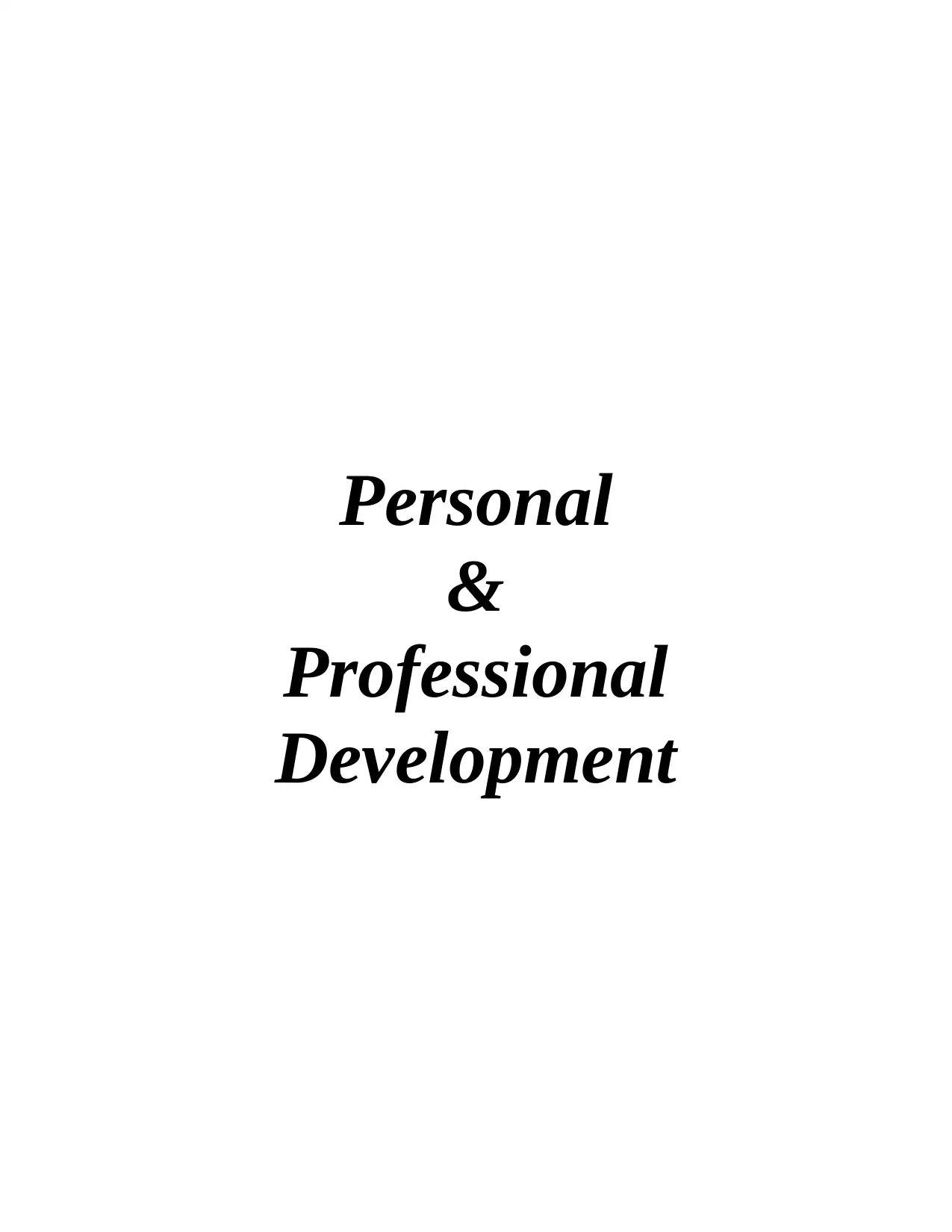
Personal
&
Professional
Development
&
Professional
Development
Paraphrase This Document
Need a fresh take? Get an instant paraphrase of this document with our AI Paraphraser
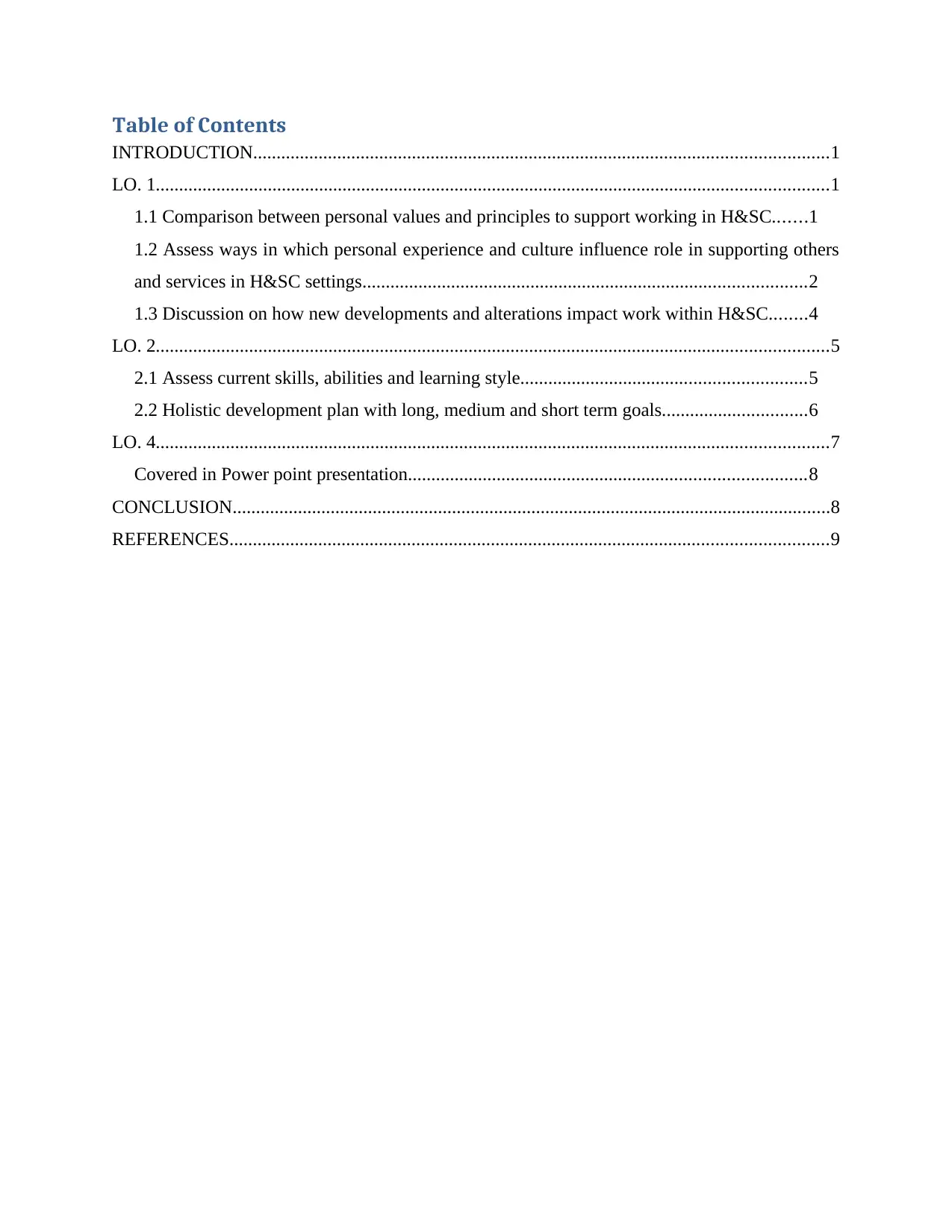
Table of Contents
INTRODUCTION...........................................................................................................................1
LO. 1................................................................................................................................................1
1.1 Comparison between personal values and principles to support working in H&SC.......1
1.2 Assess ways in which personal experience and culture influence role in supporting others
and services in H&SC settings...............................................................................................2
1.3 Discussion on how new developments and alterations impact work within H&SC........4
LO. 2................................................................................................................................................5
2.1 Assess current skills, abilities and learning style.............................................................5
2.2 Holistic development plan with long, medium and short term goals...............................6
LO. 4................................................................................................................................................7
Covered in Power point presentation.....................................................................................8
CONCLUSION................................................................................................................................8
REFERENCES................................................................................................................................9
INTRODUCTION...........................................................................................................................1
LO. 1................................................................................................................................................1
1.1 Comparison between personal values and principles to support working in H&SC.......1
1.2 Assess ways in which personal experience and culture influence role in supporting others
and services in H&SC settings...............................................................................................2
1.3 Discussion on how new developments and alterations impact work within H&SC........4
LO. 2................................................................................................................................................5
2.1 Assess current skills, abilities and learning style.............................................................5
2.2 Holistic development plan with long, medium and short term goals...............................6
LO. 4................................................................................................................................................7
Covered in Power point presentation.....................................................................................8
CONCLUSION................................................................................................................................8
REFERENCES................................................................................................................................9
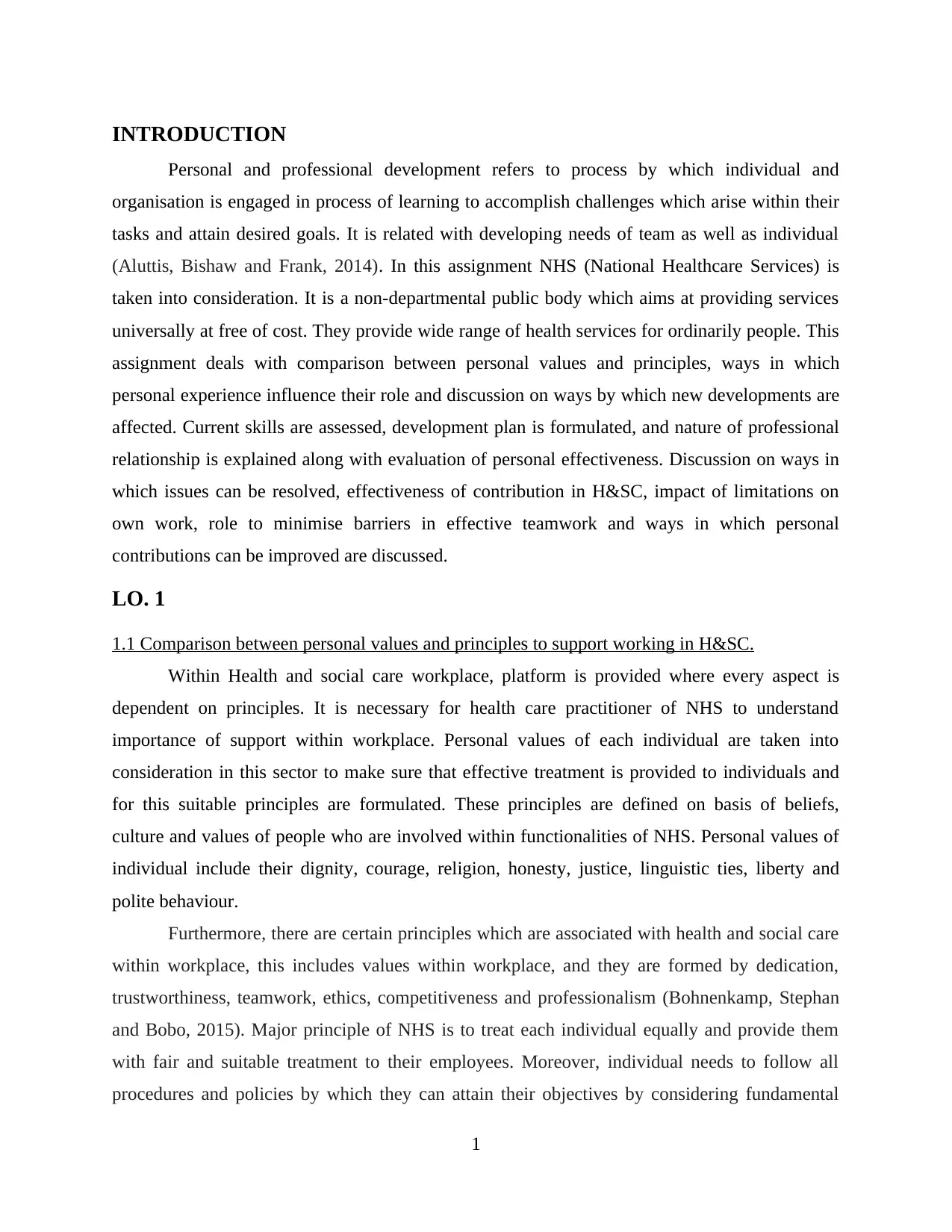
INTRODUCTION
Personal and professional development refers to process by which individual and
organisation is engaged in process of learning to accomplish challenges which arise within their
tasks and attain desired goals. It is related with developing needs of team as well as individual
(Aluttis, Bishaw and Frank, 2014). In this assignment NHS (National Healthcare Services) is
taken into consideration. It is a non-departmental public body which aims at providing services
universally at free of cost. They provide wide range of health services for ordinarily people. This
assignment deals with comparison between personal values and principles, ways in which
personal experience influence their role and discussion on ways by which new developments are
affected. Current skills are assessed, development plan is formulated, and nature of professional
relationship is explained along with evaluation of personal effectiveness. Discussion on ways in
which issues can be resolved, effectiveness of contribution in H&SC, impact of limitations on
own work, role to minimise barriers in effective teamwork and ways in which personal
contributions can be improved are discussed.
LO. 1
1.1 Comparison between personal values and principles to support working in H&SC.
Within Health and social care workplace, platform is provided where every aspect is
dependent on principles. It is necessary for health care practitioner of NHS to understand
importance of support within workplace. Personal values of each individual are taken into
consideration in this sector to make sure that effective treatment is provided to individuals and
for this suitable principles are formulated. These principles are defined on basis of beliefs,
culture and values of people who are involved within functionalities of NHS. Personal values of
individual include their dignity, courage, religion, honesty, justice, linguistic ties, liberty and
polite behaviour.
Furthermore, there are certain principles which are associated with health and social care
within workplace, this includes values within workplace, and they are formed by dedication,
trustworthiness, teamwork, ethics, competitiveness and professionalism (Bohnenkamp, Stephan
and Bobo, 2015). Major principle of NHS is to treat each individual equally and provide them
with fair and suitable treatment to their employees. Moreover, individual needs to follow all
procedures and policies by which they can attain their objectives by considering fundamental
1
Personal and professional development refers to process by which individual and
organisation is engaged in process of learning to accomplish challenges which arise within their
tasks and attain desired goals. It is related with developing needs of team as well as individual
(Aluttis, Bishaw and Frank, 2014). In this assignment NHS (National Healthcare Services) is
taken into consideration. It is a non-departmental public body which aims at providing services
universally at free of cost. They provide wide range of health services for ordinarily people. This
assignment deals with comparison between personal values and principles, ways in which
personal experience influence their role and discussion on ways by which new developments are
affected. Current skills are assessed, development plan is formulated, and nature of professional
relationship is explained along with evaluation of personal effectiveness. Discussion on ways in
which issues can be resolved, effectiveness of contribution in H&SC, impact of limitations on
own work, role to minimise barriers in effective teamwork and ways in which personal
contributions can be improved are discussed.
LO. 1
1.1 Comparison between personal values and principles to support working in H&SC.
Within Health and social care workplace, platform is provided where every aspect is
dependent on principles. It is necessary for health care practitioner of NHS to understand
importance of support within workplace. Personal values of each individual are taken into
consideration in this sector to make sure that effective treatment is provided to individuals and
for this suitable principles are formulated. These principles are defined on basis of beliefs,
culture and values of people who are involved within functionalities of NHS. Personal values of
individual include their dignity, courage, religion, honesty, justice, linguistic ties, liberty and
polite behaviour.
Furthermore, there are certain principles which are associated with health and social care
within workplace, this includes values within workplace, and they are formed by dedication,
trustworthiness, teamwork, ethics, competitiveness and professionalism (Bohnenkamp, Stephan
and Bobo, 2015). Major principle of NHS is to treat each individual equally and provide them
with fair and suitable treatment to their employees. Moreover, individual needs to follow all
procedures and policies by which they can attain their objectives by considering fundamental
1
⊘ This is a preview!⊘
Do you want full access?
Subscribe today to unlock all pages.

Trusted by 1+ million students worldwide
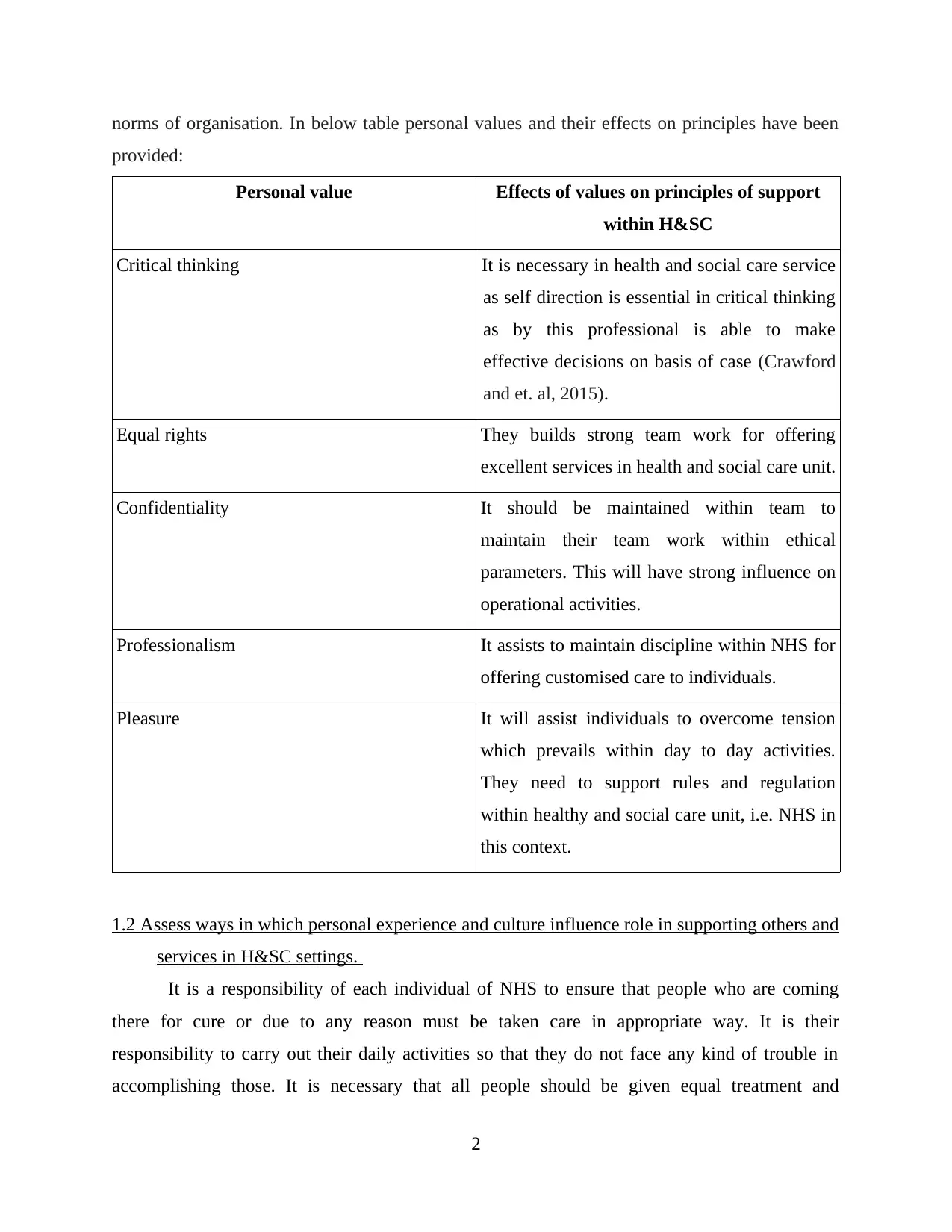
norms of organisation. In below table personal values and their effects on principles have been
provided:
Personal value Effects of values on principles of support
within H&SC
Critical thinking It is necessary in health and social care service
as self direction is essential in critical thinking
as by this professional is able to make
effective decisions on basis of case (Crawford
and et. al, 2015).
Equal rights They builds strong team work for offering
excellent services in health and social care unit.
Confidentiality It should be maintained within team to
maintain their team work within ethical
parameters. This will have strong influence on
operational activities.
Professionalism It assists to maintain discipline within NHS for
offering customised care to individuals.
Pleasure It will assist individuals to overcome tension
which prevails within day to day activities.
They need to support rules and regulation
within healthy and social care unit, i.e. NHS in
this context.
1.2 Assess ways in which personal experience and culture influence role in supporting others and
services in H&SC settings.
It is a responsibility of each individual of NHS to ensure that people who are coming
there for cure or due to any reason must be taken care in appropriate way. It is their
responsibility to carry out their daily activities so that they do not face any kind of trouble in
accomplishing those. It is necessary that all people should be given equal treatment and
2
provided:
Personal value Effects of values on principles of support
within H&SC
Critical thinking It is necessary in health and social care service
as self direction is essential in critical thinking
as by this professional is able to make
effective decisions on basis of case (Crawford
and et. al, 2015).
Equal rights They builds strong team work for offering
excellent services in health and social care unit.
Confidentiality It should be maintained within team to
maintain their team work within ethical
parameters. This will have strong influence on
operational activities.
Professionalism It assists to maintain discipline within NHS for
offering customised care to individuals.
Pleasure It will assist individuals to overcome tension
which prevails within day to day activities.
They need to support rules and regulation
within healthy and social care unit, i.e. NHS in
this context.
1.2 Assess ways in which personal experience and culture influence role in supporting others and
services in H&SC settings.
It is a responsibility of each individual of NHS to ensure that people who are coming
there for cure or due to any reason must be taken care in appropriate way. It is their
responsibility to carry out their daily activities so that they do not face any kind of trouble in
accomplishing those. It is necessary that all people should be given equal treatment and
2
Paraphrase This Document
Need a fresh take? Get an instant paraphrase of this document with our AI Paraphraser
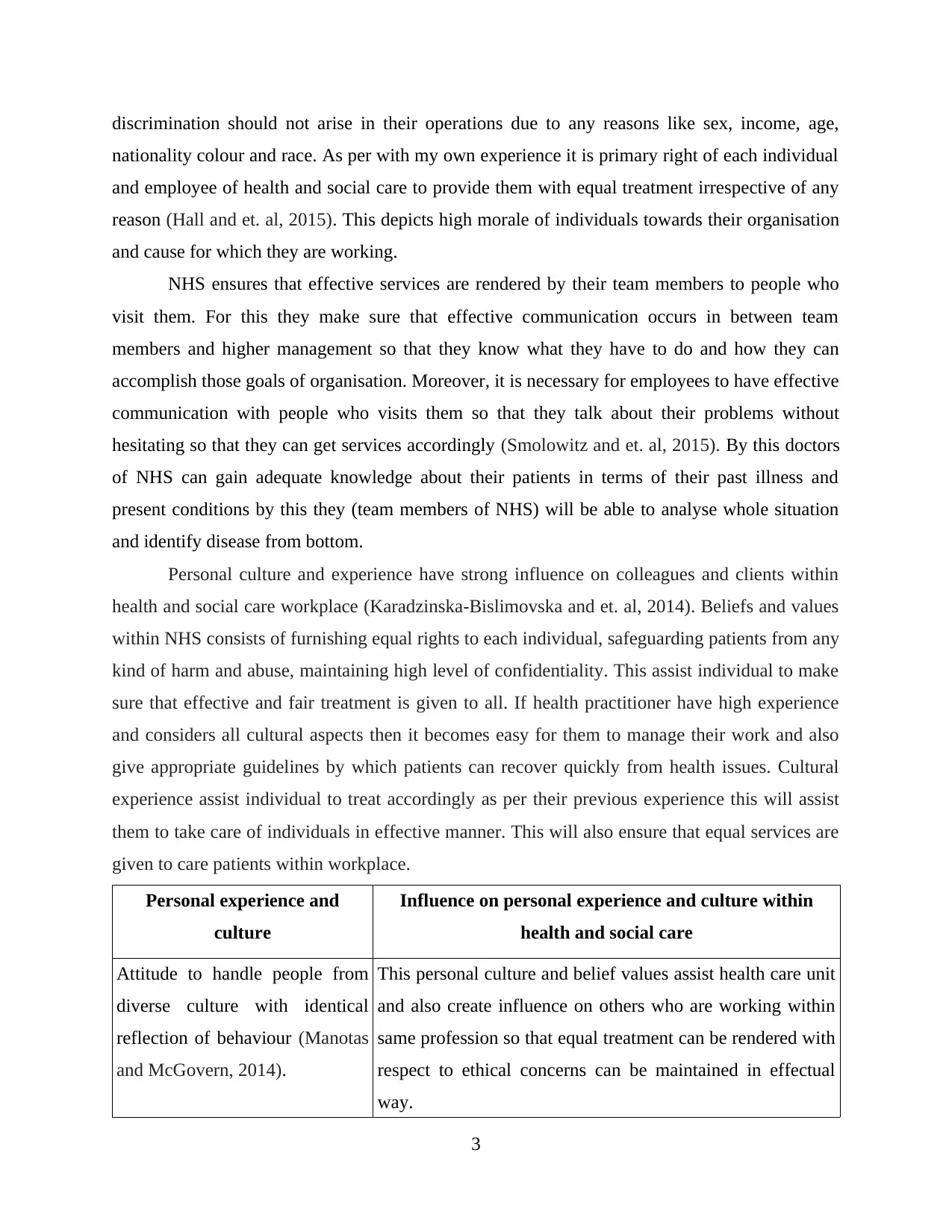
discrimination should not arise in their operations due to any reasons like sex, income, age,
nationality colour and race. As per with my own experience it is primary right of each individual
and employee of health and social care to provide them with equal treatment irrespective of any
reason (Hall and et. al, 2015). This depicts high morale of individuals towards their organisation
and cause for which they are working.
NHS ensures that effective services are rendered by their team members to people who
visit them. For this they make sure that effective communication occurs in between team
members and higher management so that they know what they have to do and how they can
accomplish those goals of organisation. Moreover, it is necessary for employees to have effective
communication with people who visits them so that they talk about their problems without
hesitating so that they can get services accordingly (Smolowitz and et. al, 2015). By this doctors
of NHS can gain adequate knowledge about their patients in terms of their past illness and
present conditions by this they (team members of NHS) will be able to analyse whole situation
and identify disease from bottom.
Personal culture and experience have strong influence on colleagues and clients within
health and social care workplace (Karadzinska‐Bislimovska and et. al, 2014). Beliefs and values
within NHS consists of furnishing equal rights to each individual, safeguarding patients from any
kind of harm and abuse, maintaining high level of confidentiality. This assist individual to make
sure that effective and fair treatment is given to all. If health practitioner have high experience
and considers all cultural aspects then it becomes easy for them to manage their work and also
give appropriate guidelines by which patients can recover quickly from health issues. Cultural
experience assist individual to treat accordingly as per their previous experience this will assist
them to take care of individuals in effective manner. This will also ensure that equal services are
given to care patients within workplace.
Personal experience and
culture
Influence on personal experience and culture within
health and social care
Attitude to handle people from
diverse culture with identical
reflection of behaviour (Manotas
and McGovern, 2014).
This personal culture and belief values assist health care unit
and also create influence on others who are working within
same profession so that equal treatment can be rendered with
respect to ethical concerns can be maintained in effectual
way.
3
nationality colour and race. As per with my own experience it is primary right of each individual
and employee of health and social care to provide them with equal treatment irrespective of any
reason (Hall and et. al, 2015). This depicts high morale of individuals towards their organisation
and cause for which they are working.
NHS ensures that effective services are rendered by their team members to people who
visit them. For this they make sure that effective communication occurs in between team
members and higher management so that they know what they have to do and how they can
accomplish those goals of organisation. Moreover, it is necessary for employees to have effective
communication with people who visits them so that they talk about their problems without
hesitating so that they can get services accordingly (Smolowitz and et. al, 2015). By this doctors
of NHS can gain adequate knowledge about their patients in terms of their past illness and
present conditions by this they (team members of NHS) will be able to analyse whole situation
and identify disease from bottom.
Personal culture and experience have strong influence on colleagues and clients within
health and social care workplace (Karadzinska‐Bislimovska and et. al, 2014). Beliefs and values
within NHS consists of furnishing equal rights to each individual, safeguarding patients from any
kind of harm and abuse, maintaining high level of confidentiality. This assist individual to make
sure that effective and fair treatment is given to all. If health practitioner have high experience
and considers all cultural aspects then it becomes easy for them to manage their work and also
give appropriate guidelines by which patients can recover quickly from health issues. Cultural
experience assist individual to treat accordingly as per their previous experience this will assist
them to take care of individuals in effective manner. This will also ensure that equal services are
given to care patients within workplace.
Personal experience and
culture
Influence on personal experience and culture within
health and social care
Attitude to handle people from
diverse culture with identical
reflection of behaviour (Manotas
and McGovern, 2014).
This personal culture and belief values assist health care unit
and also create influence on others who are working within
same profession so that equal treatment can be rendered with
respect to ethical concerns can be maintained in effectual
way.
3
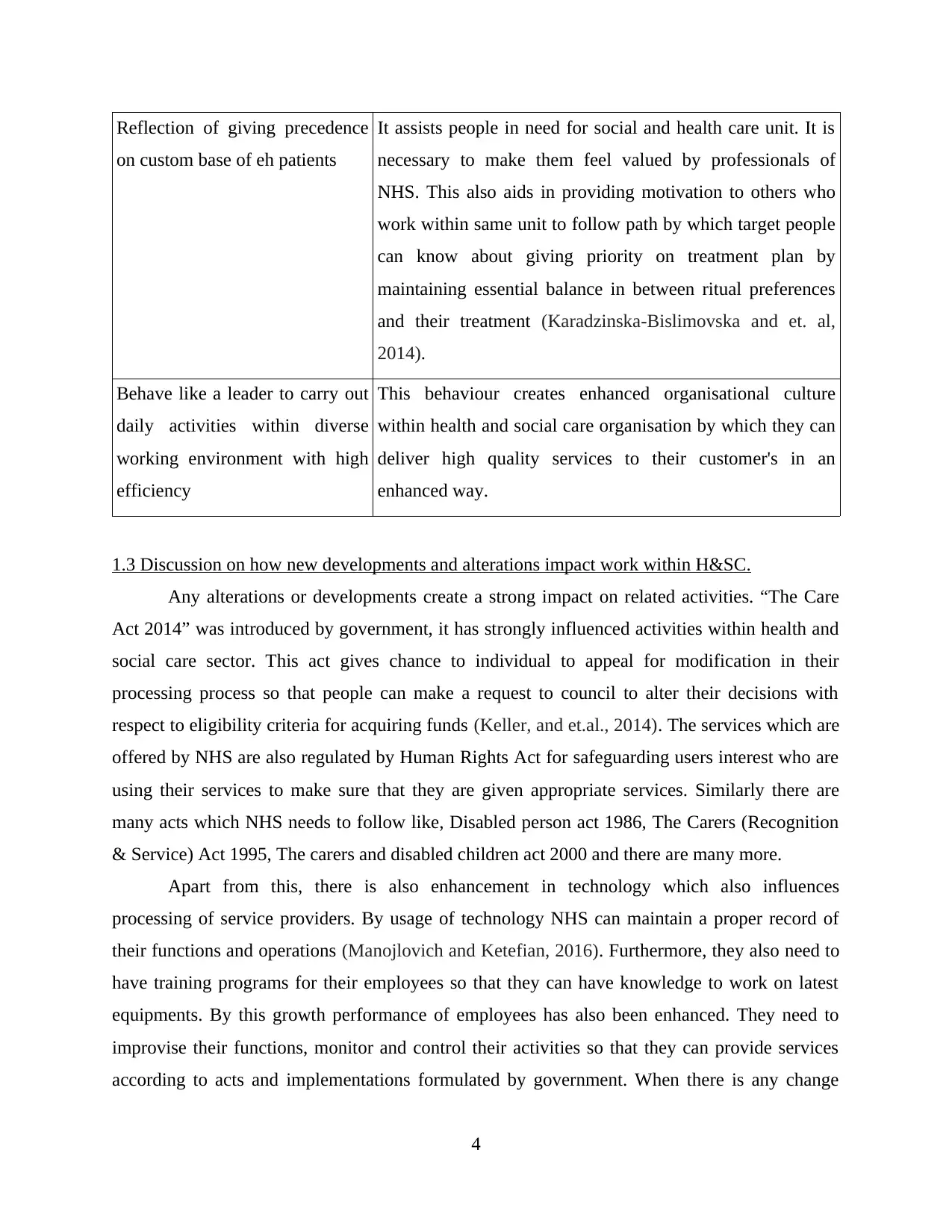
Reflection of giving precedence
on custom base of eh patients
It assists people in need for social and health care unit. It is
necessary to make them feel valued by professionals of
NHS. This also aids in providing motivation to others who
work within same unit to follow path by which target people
can know about giving priority on treatment plan by
maintaining essential balance in between ritual preferences
and their treatment (Karadzinska‐Bislimovska and et. al,
2014).
Behave like a leader to carry out
daily activities within diverse
working environment with high
efficiency
This behaviour creates enhanced organisational culture
within health and social care organisation by which they can
deliver high quality services to their customer's in an
enhanced way.
1.3 Discussion on how new developments and alterations impact work within H&SC.
Any alterations or developments create a strong impact on related activities. “The Care
Act 2014” was introduced by government, it has strongly influenced activities within health and
social care sector. This act gives chance to individual to appeal for modification in their
processing process so that people can make a request to council to alter their decisions with
respect to eligibility criteria for acquiring funds (Keller, and et.al., 2014). The services which are
offered by NHS are also regulated by Human Rights Act for safeguarding users interest who are
using their services to make sure that they are given appropriate services. Similarly there are
many acts which NHS needs to follow like, Disabled person act 1986, The Carers (Recognition
& Service) Act 1995, The carers and disabled children act 2000 and there are many more.
Apart from this, there is also enhancement in technology which also influences
processing of service providers. By usage of technology NHS can maintain a proper record of
their functions and operations (Manojlovich and Ketefian, 2016). Furthermore, they also need to
have training programs for their employees so that they can have knowledge to work on latest
equipments. By this growth performance of employees has also been enhanced. They need to
improvise their functions, monitor and control their activities so that they can provide services
according to acts and implementations formulated by government. When there is any change
4
on custom base of eh patients
It assists people in need for social and health care unit. It is
necessary to make them feel valued by professionals of
NHS. This also aids in providing motivation to others who
work within same unit to follow path by which target people
can know about giving priority on treatment plan by
maintaining essential balance in between ritual preferences
and their treatment (Karadzinska‐Bislimovska and et. al,
2014).
Behave like a leader to carry out
daily activities within diverse
working environment with high
efficiency
This behaviour creates enhanced organisational culture
within health and social care organisation by which they can
deliver high quality services to their customer's in an
enhanced way.
1.3 Discussion on how new developments and alterations impact work within H&SC.
Any alterations or developments create a strong impact on related activities. “The Care
Act 2014” was introduced by government, it has strongly influenced activities within health and
social care sector. This act gives chance to individual to appeal for modification in their
processing process so that people can make a request to council to alter their decisions with
respect to eligibility criteria for acquiring funds (Keller, and et.al., 2014). The services which are
offered by NHS are also regulated by Human Rights Act for safeguarding users interest who are
using their services to make sure that they are given appropriate services. Similarly there are
many acts which NHS needs to follow like, Disabled person act 1986, The Carers (Recognition
& Service) Act 1995, The carers and disabled children act 2000 and there are many more.
Apart from this, there is also enhancement in technology which also influences
processing of service providers. By usage of technology NHS can maintain a proper record of
their functions and operations (Manojlovich and Ketefian, 2016). Furthermore, they also need to
have training programs for their employees so that they can have knowledge to work on latest
equipments. By this growth performance of employees has also been enhanced. They need to
improvise their functions, monitor and control their activities so that they can provide services
according to acts and implementations formulated by government. When there is any change
4
⊘ This is a preview!⊘
Do you want full access?
Subscribe today to unlock all pages.

Trusted by 1+ million students worldwide
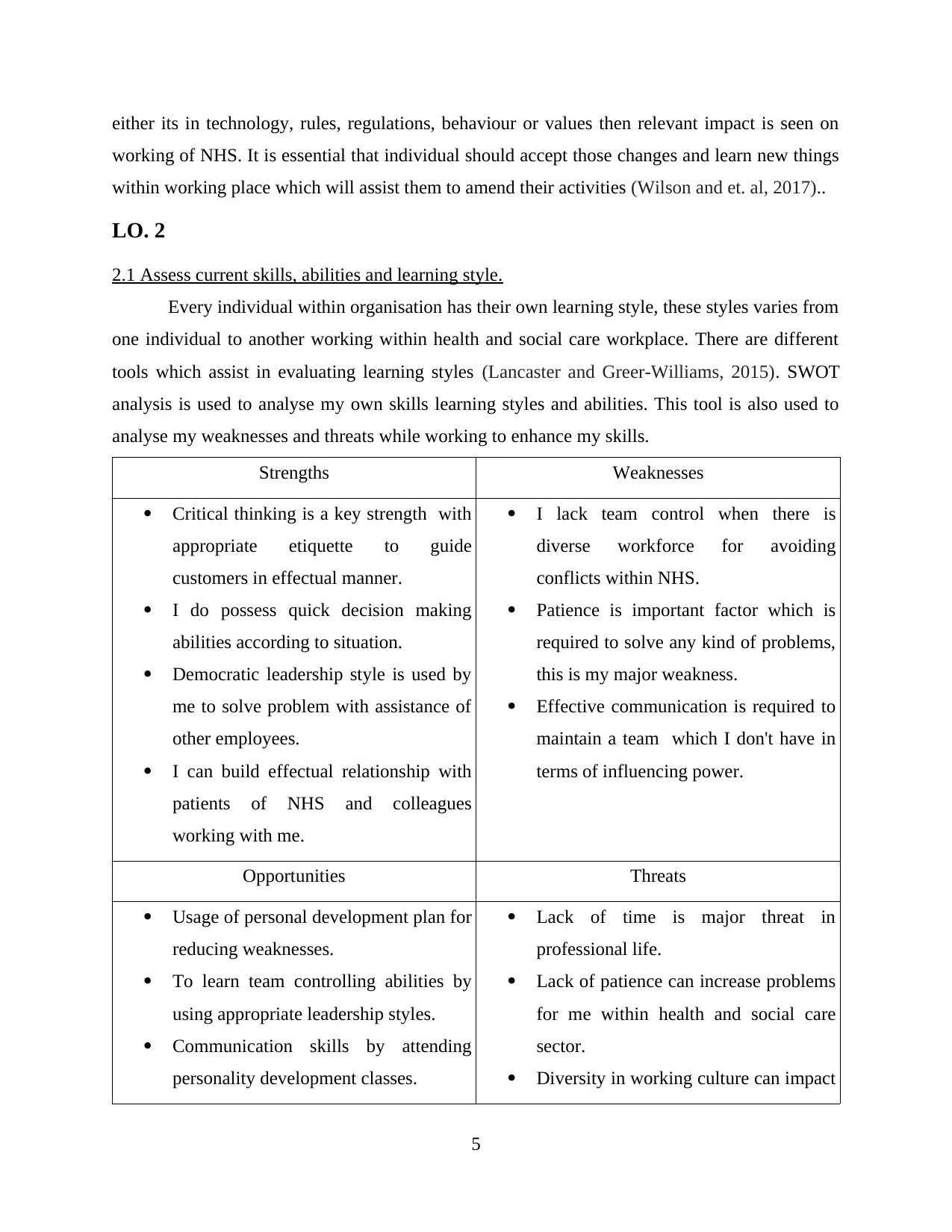
either its in technology, rules, regulations, behaviour or values then relevant impact is seen on
working of NHS. It is essential that individual should accept those changes and learn new things
within working place which will assist them to amend their activities (Wilson and et. al, 2017)..
LO. 2
2.1 Assess current skills, abilities and learning style.
Every individual within organisation has their own learning style, these styles varies from
one individual to another working within health and social care workplace. There are different
tools which assist in evaluating learning styles (Lancaster and Greer‐Williams, 2015). SWOT
analysis is used to analyse my own skills learning styles and abilities. This tool is also used to
analyse my weaknesses and threats while working to enhance my skills.
Strengths Weaknesses
Critical thinking is a key strength with
appropriate etiquette to guide
customers in effectual manner.
I do possess quick decision making
abilities according to situation.
Democratic leadership style is used by
me to solve problem with assistance of
other employees.
I can build effectual relationship with
patients of NHS and colleagues
working with me.
I lack team control when there is
diverse workforce for avoiding
conflicts within NHS.
Patience is important factor which is
required to solve any kind of problems,
this is my major weakness.
Effective communication is required to
maintain a team which I don't have in
terms of influencing power.
Opportunities Threats
Usage of personal development plan for
reducing weaknesses.
To learn team controlling abilities by
using appropriate leadership styles.
Communication skills by attending
personality development classes.
Lack of time is major threat in
professional life.
Lack of patience can increase problems
for me within health and social care
sector.
Diversity in working culture can impact
5
working of NHS. It is essential that individual should accept those changes and learn new things
within working place which will assist them to amend their activities (Wilson and et. al, 2017)..
LO. 2
2.1 Assess current skills, abilities and learning style.
Every individual within organisation has their own learning style, these styles varies from
one individual to another working within health and social care workplace. There are different
tools which assist in evaluating learning styles (Lancaster and Greer‐Williams, 2015). SWOT
analysis is used to analyse my own skills learning styles and abilities. This tool is also used to
analyse my weaknesses and threats while working to enhance my skills.
Strengths Weaknesses
Critical thinking is a key strength with
appropriate etiquette to guide
customers in effectual manner.
I do possess quick decision making
abilities according to situation.
Democratic leadership style is used by
me to solve problem with assistance of
other employees.
I can build effectual relationship with
patients of NHS and colleagues
working with me.
I lack team control when there is
diverse workforce for avoiding
conflicts within NHS.
Patience is important factor which is
required to solve any kind of problems,
this is my major weakness.
Effective communication is required to
maintain a team which I don't have in
terms of influencing power.
Opportunities Threats
Usage of personal development plan for
reducing weaknesses.
To learn team controlling abilities by
using appropriate leadership styles.
Communication skills by attending
personality development classes.
Lack of time is major threat in
professional life.
Lack of patience can increase problems
for me within health and social care
sector.
Diversity in working culture can impact
5
Paraphrase This Document
Need a fresh take? Get an instant paraphrase of this document with our AI Paraphraser
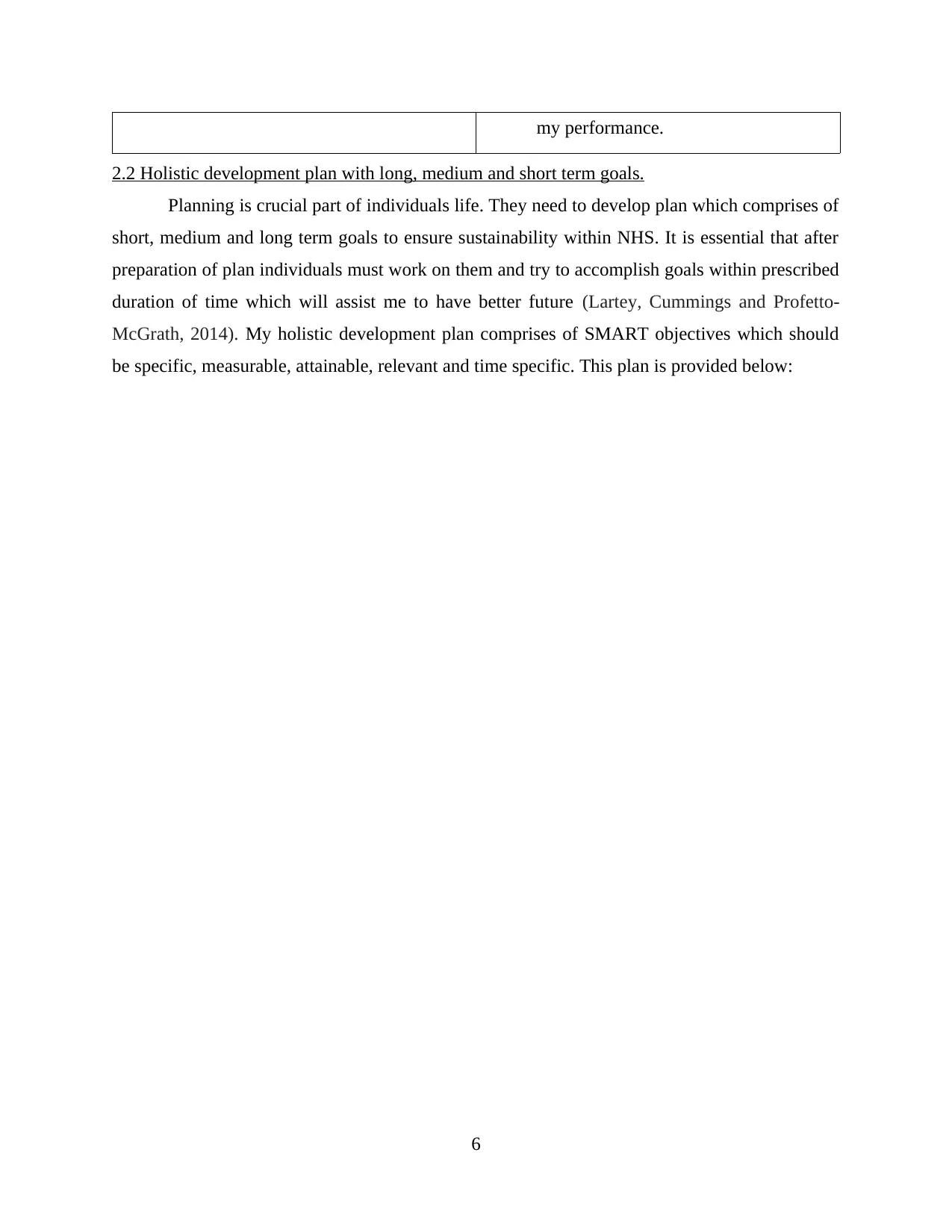
my performance.
2.2 Holistic development plan with long, medium and short term goals.
Planning is crucial part of individuals life. They need to develop plan which comprises of
short, medium and long term goals to ensure sustainability within NHS. It is essential that after
preparation of plan individuals must work on them and try to accomplish goals within prescribed
duration of time which will assist me to have better future (Lartey, Cummings and Profetto‐
McGrath, 2014). My holistic development plan comprises of SMART objectives which should
be specific, measurable, attainable, relevant and time specific. This plan is provided below:
6
2.2 Holistic development plan with long, medium and short term goals.
Planning is crucial part of individuals life. They need to develop plan which comprises of
short, medium and long term goals to ensure sustainability within NHS. It is essential that after
preparation of plan individuals must work on them and try to accomplish goals within prescribed
duration of time which will assist me to have better future (Lartey, Cummings and Profetto‐
McGrath, 2014). My holistic development plan comprises of SMART objectives which should
be specific, measurable, attainable, relevant and time specific. This plan is provided below:
6
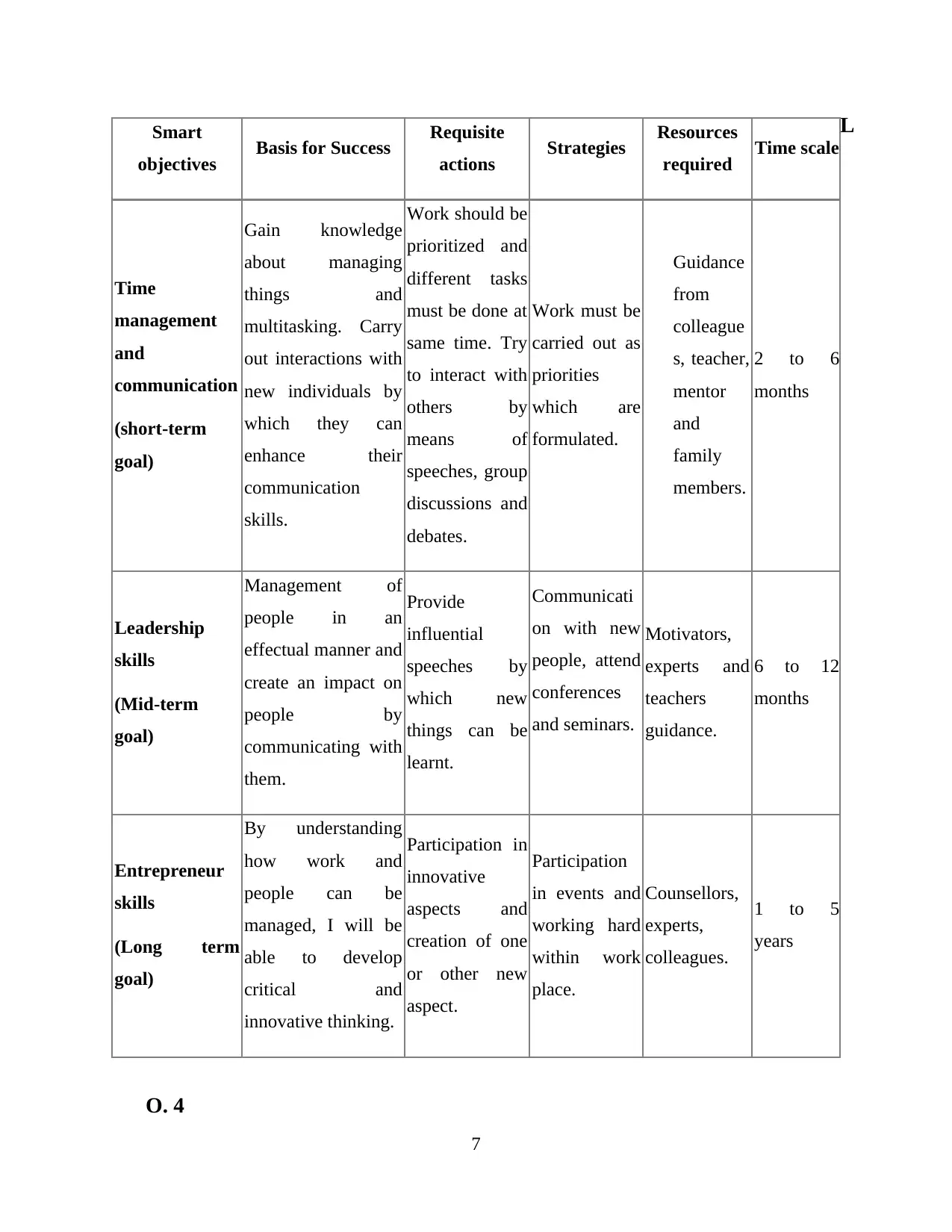
L
O. 4
7
Smart
objectives Basis for Success Requisite
actions Strategies Resources
required Time scale
Time
management
and
communication
(short-term
goal)
Gain knowledge
about managing
things and
multitasking. Carry
out interactions with
new individuals by
which they can
enhance their
communication
skills.
Work should be
prioritized and
different tasks
must be done at
same time. Try
to interact with
others by
means of
speeches, group
discussions and
debates.
Work must be
carried out as
priorities
which are
formulated.
Guidance
from
colleague
s, teacher,
mentor
and
family
members.
2 to 6
months
Leadership
skills
(Mid-term
goal)
Management of
people in an
effectual manner and
create an impact on
people by
communicating with
them.
Provide
influential
speeches by
which new
things can be
learnt.
Communicati
on with new
people, attend
conferences
and seminars.
Motivators,
experts and
teachers
guidance.
6 to 12
months
Entrepreneur
skills
(Long term
goal)
By understanding
how work and
people can be
managed, I will be
able to develop
critical and
innovative thinking.
Participation in
innovative
aspects and
creation of one
or other new
aspect.
Participation
in events and
working hard
within work
place.
Counsellors,
experts,
colleagues.
1 to 5
years
O. 4
7
Smart
objectives Basis for Success Requisite
actions Strategies Resources
required Time scale
Time
management
and
communication
(short-term
goal)
Gain knowledge
about managing
things and
multitasking. Carry
out interactions with
new individuals by
which they can
enhance their
communication
skills.
Work should be
prioritized and
different tasks
must be done at
same time. Try
to interact with
others by
means of
speeches, group
discussions and
debates.
Work must be
carried out as
priorities
which are
formulated.
Guidance
from
colleague
s, teacher,
mentor
and
family
members.
2 to 6
months
Leadership
skills
(Mid-term
goal)
Management of
people in an
effectual manner and
create an impact on
people by
communicating with
them.
Provide
influential
speeches by
which new
things can be
learnt.
Communicati
on with new
people, attend
conferences
and seminars.
Motivators,
experts and
teachers
guidance.
6 to 12
months
Entrepreneur
skills
(Long term
goal)
By understanding
how work and
people can be
managed, I will be
able to develop
critical and
innovative thinking.
Participation in
innovative
aspects and
creation of one
or other new
aspect.
Participation
in events and
working hard
within work
place.
Counsellors,
experts,
colleagues.
1 to 5
years
⊘ This is a preview!⊘
Do you want full access?
Subscribe today to unlock all pages.

Trusted by 1+ million students worldwide
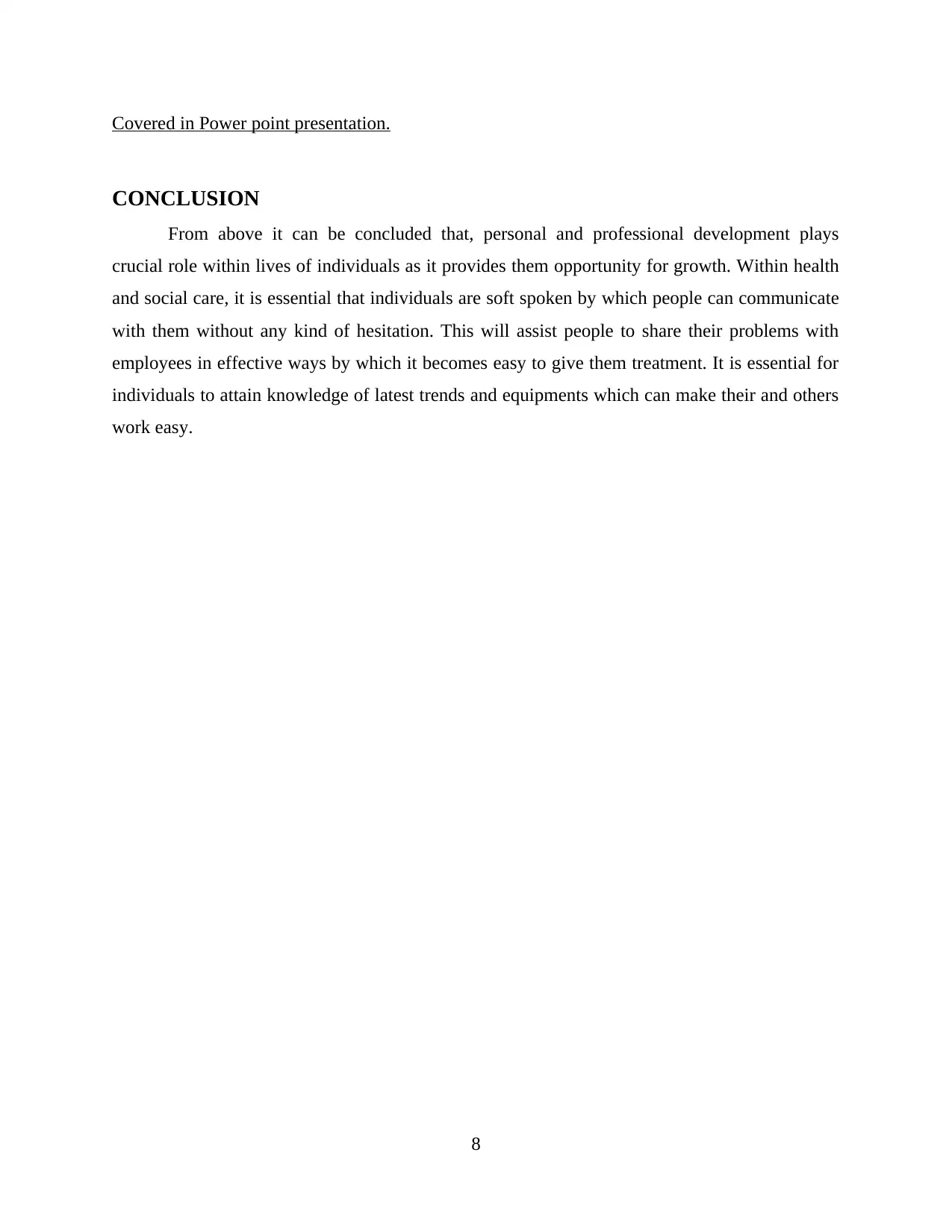
Covered in Power point presentation.
CONCLUSION
From above it can be concluded that, personal and professional development plays
crucial role within lives of individuals as it provides them opportunity for growth. Within health
and social care, it is essential that individuals are soft spoken by which people can communicate
with them without any kind of hesitation. This will assist people to share their problems with
employees in effective ways by which it becomes easy to give them treatment. It is essential for
individuals to attain knowledge of latest trends and equipments which can make their and others
work easy.
8
CONCLUSION
From above it can be concluded that, personal and professional development plays
crucial role within lives of individuals as it provides them opportunity for growth. Within health
and social care, it is essential that individuals are soft spoken by which people can communicate
with them without any kind of hesitation. This will assist people to share their problems with
employees in effective ways by which it becomes easy to give them treatment. It is essential for
individuals to attain knowledge of latest trends and equipments which can make their and others
work easy.
8
Paraphrase This Document
Need a fresh take? Get an instant paraphrase of this document with our AI Paraphraser
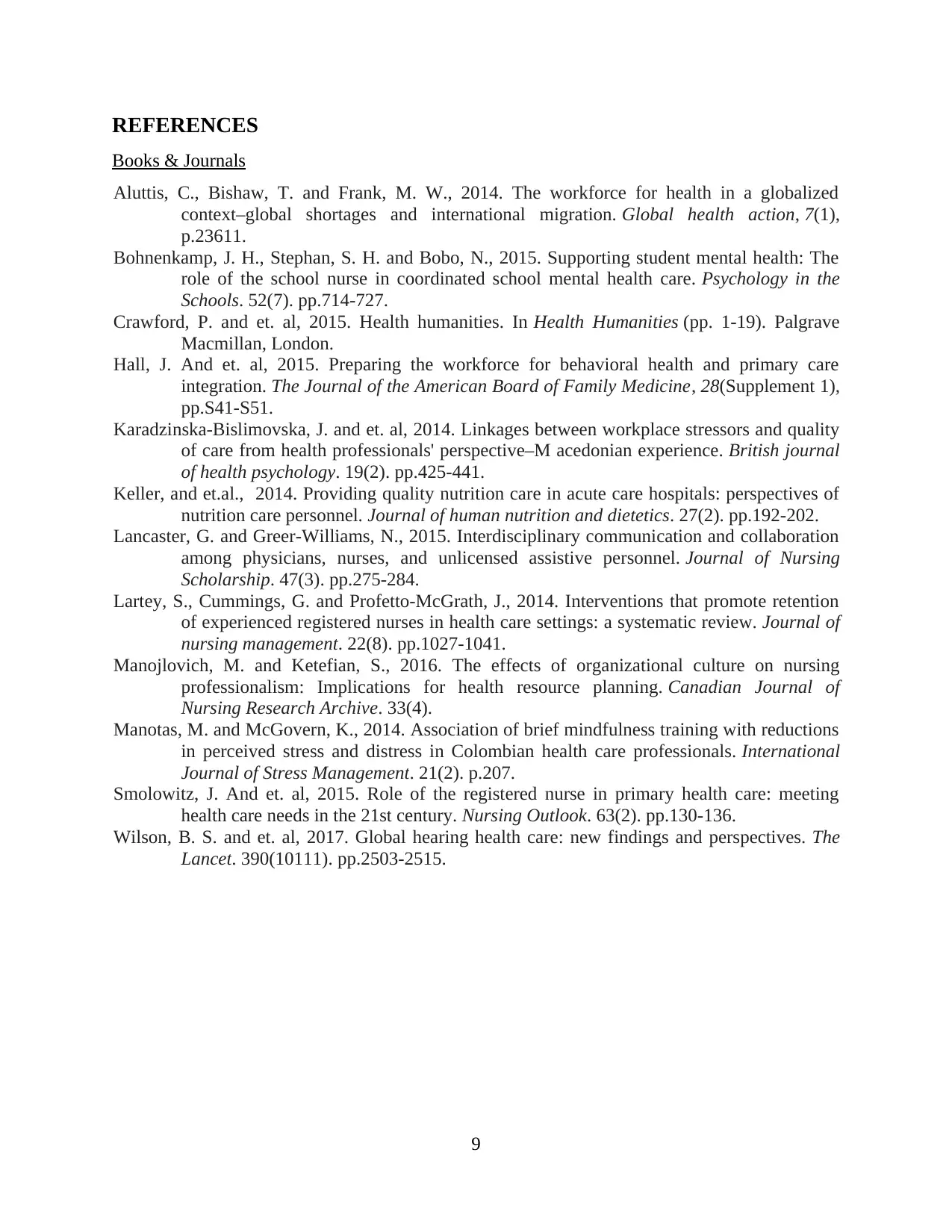
REFERENCES
Books & Journals
Aluttis, C., Bishaw, T. and Frank, M. W., 2014. The workforce for health in a globalized
context–global shortages and international migration. Global health action, 7(1),
p.23611.
Bohnenkamp, J. H., Stephan, S. H. and Bobo, N., 2015. Supporting student mental health: The
role of the school nurse in coordinated school mental health care. Psychology in the
Schools. 52(7). pp.714-727.
Crawford, P. and et. al, 2015. Health humanities. In Health Humanities (pp. 1-19). Palgrave
Macmillan, London.
Hall, J. And et. al, 2015. Preparing the workforce for behavioral health and primary care
integration. The Journal of the American Board of Family Medicine, 28(Supplement 1),
pp.S41-S51.
Karadzinska‐Bislimovska, J. and et. al, 2014. Linkages between workplace stressors and quality
of care from health professionals' perspective–M acedonian experience. British journal
of health psychology. 19(2). pp.425-441.
Keller, and et.al., 2014. Providing quality nutrition care in acute care hospitals: perspectives of
nutrition care personnel. Journal of human nutrition and dietetics. 27(2). pp.192-202.
Lancaster, G. and Greer‐Williams, N., 2015. Interdisciplinary communication and collaboration
among physicians, nurses, and unlicensed assistive personnel. Journal of Nursing
Scholarship. 47(3). pp.275-284.
Lartey, S., Cummings, G. and Profetto‐McGrath, J., 2014. Interventions that promote retention
of experienced registered nurses in health care settings: a systematic review. Journal of
nursing management. 22(8). pp.1027-1041.
Manojlovich, M. and Ketefian, S., 2016. The effects of organizational culture on nursing
professionalism: Implications for health resource planning. Canadian Journal of
Nursing Research Archive. 33(4).
Manotas, M. and McGovern, K., 2014. Association of brief mindfulness training with reductions
in perceived stress and distress in Colombian health care professionals. International
Journal of Stress Management. 21(2). p.207.
Smolowitz, J. And et. al, 2015. Role of the registered nurse in primary health care: meeting
health care needs in the 21st century. Nursing Outlook. 63(2). pp.130-136.
Wilson, B. S. and et. al, 2017. Global hearing health care: new findings and perspectives. The
Lancet. 390(10111). pp.2503-2515.
9
Books & Journals
Aluttis, C., Bishaw, T. and Frank, M. W., 2014. The workforce for health in a globalized
context–global shortages and international migration. Global health action, 7(1),
p.23611.
Bohnenkamp, J. H., Stephan, S. H. and Bobo, N., 2015. Supporting student mental health: The
role of the school nurse in coordinated school mental health care. Psychology in the
Schools. 52(7). pp.714-727.
Crawford, P. and et. al, 2015. Health humanities. In Health Humanities (pp. 1-19). Palgrave
Macmillan, London.
Hall, J. And et. al, 2015. Preparing the workforce for behavioral health and primary care
integration. The Journal of the American Board of Family Medicine, 28(Supplement 1),
pp.S41-S51.
Karadzinska‐Bislimovska, J. and et. al, 2014. Linkages between workplace stressors and quality
of care from health professionals' perspective–M acedonian experience. British journal
of health psychology. 19(2). pp.425-441.
Keller, and et.al., 2014. Providing quality nutrition care in acute care hospitals: perspectives of
nutrition care personnel. Journal of human nutrition and dietetics. 27(2). pp.192-202.
Lancaster, G. and Greer‐Williams, N., 2015. Interdisciplinary communication and collaboration
among physicians, nurses, and unlicensed assistive personnel. Journal of Nursing
Scholarship. 47(3). pp.275-284.
Lartey, S., Cummings, G. and Profetto‐McGrath, J., 2014. Interventions that promote retention
of experienced registered nurses in health care settings: a systematic review. Journal of
nursing management. 22(8). pp.1027-1041.
Manojlovich, M. and Ketefian, S., 2016. The effects of organizational culture on nursing
professionalism: Implications for health resource planning. Canadian Journal of
Nursing Research Archive. 33(4).
Manotas, M. and McGovern, K., 2014. Association of brief mindfulness training with reductions
in perceived stress and distress in Colombian health care professionals. International
Journal of Stress Management. 21(2). p.207.
Smolowitz, J. And et. al, 2015. Role of the registered nurse in primary health care: meeting
health care needs in the 21st century. Nursing Outlook. 63(2). pp.130-136.
Wilson, B. S. and et. al, 2017. Global hearing health care: new findings and perspectives. The
Lancet. 390(10111). pp.2503-2515.
9
1 out of 11
Related Documents
Your All-in-One AI-Powered Toolkit for Academic Success.
+13062052269
info@desklib.com
Available 24*7 on WhatsApp / Email
![[object Object]](/_next/static/media/star-bottom.7253800d.svg)
Unlock your academic potential
Copyright © 2020–2026 A2Z Services. All Rights Reserved. Developed and managed by ZUCOL.





